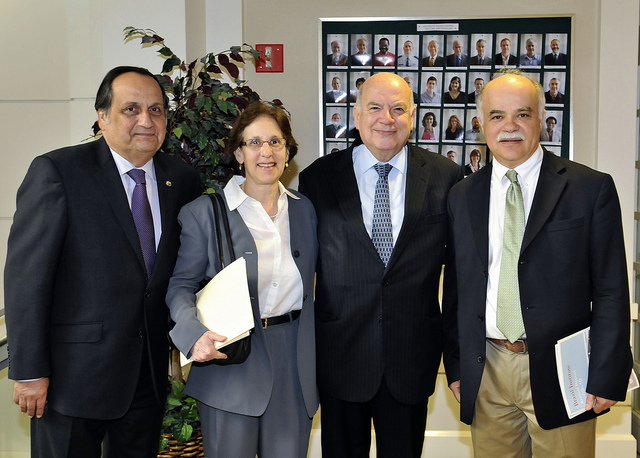|

|
 |
|
Last Updated: Feb 6, 2017 - 2:32:04 PM |

From left to right:
Joaquín Maza, Ambassador, Permanent Representative of El Salvador to the OAS
Cynthia Arnson, Director, Latin American Program, Woodrow Wilson Center
José Miguel Insulza, OAS Secretary General
Paulo Sotelo Photo: Juan Manuel Herrera/OAS
|
The
Secretary General of the Organization of American States (OAS), José
Miguel Insulza, today advocated for a more comprehensive
transnational approach in facing citizen insecurity and organized
crime during his remarks at the event, “Previewing the OAS General
Assembly: Citizen Security in the Americas,” held at the Woodrow
Wilson International Center for Scholars in Washington,
DC.
At the meeting, in preview of the 41st OAS General
Assembly to be held June 5 to 7, 2011, in San Salvador, with the
theme of “Citizen Security in the Americas,” Secretary General
Insulza was accompanied by the OAS Secretary for Multidimensional
Security, Adam Blackwell; the Permanent Representative of El
Salvador to the OAS, Joaquín Maza; Francisco Lloreda, Presidential
Counselor for Citizen Security of Colombia; and Francis Forbes,
Advisor at the Implementation Agency for Crime and Security (IMPACS)
of the Caribbean Community (CARICOM). The event was moderated by
Cynthia Arnson, Director of the Latin American Program at the
Woodrow Wilson Center, and Adam Stubits, a Program
Associate.
The head of the OAS said the countries of the
region must adopt a multilateral and broad approach to the problem
of citizen insecurity and organized crime, one that not only relies
on law enforcement and repression, but that includes drug demand
reduction campaigns, and advocates for an improvement in penal and
social reintegration services. In this context, he recalled that the
Member States must be willing to commit resources that help improve
cooperation among them.
“What I’m expecting from this
Assembly is that we can really get started on something, that we
agree on some concrete things on which to build our work together,”
the Secretary General said. “Of course the main work is going to be
done by countries, but the whole approach has to be transnational.
And the cooperation between countries, police, judges, and
governments is still very weak. We have to get some concrete
agreements on a multinational approach, and I hope we can get there
provided that everyone is willing to cooperate.” If the current
approach does not improve “we will continue with the same strategy
and we will end up with a very special situation, with more and more
people in our prisons, more seized drugs, and the drugs will
continue to flow, because the demand will always be there,” he
added.
Secretary General Insulza mentioned the “structural”
problems that continue to be present in the region—among them
poverty, inequality, and discrimination—and that are tightly linked
to the problems of crime. In his view, all of them are obstacles to
the economic growth experienced today by Latin America and to the
optimistic forecasts on development for the future.
The
Chilean diplomat recalled other instances in the history of the
region that promised uninterrupted economic growth and warned that
“since Latin America has at other times been overly optimistic, it
is important to watch over these problems and to do it precisely at
this moment of growth.”
For his part, the OAS Secretary for
Multidimensional Security, Adam Blackwell, spoke about the nature of
organized crime as “networks,” explaining that it is necessary to
seek the leadership of the Organization to increase cooperation
among countries. “As a leading regional organization for the western
hemisphere, the OAS serves as headquarters, technical secretariat,
or coordinator for the Hemisphere’s most important political and
technical forums in the security area,” he said. He added that
“these permanent discussion and decision-making forums enable the
highest law enforcement and public security authorities of our
Hemisphere to identify the most profound causes of the phenomenon of
crime and violence in the region and to build consensus and generate
coordinated actions to address it.”
Ambassador Blackwell
recalled that at the OAS there are bodies that have arisen out of
the need to push for a “network” approach to address this problem,
and he mentioned among them the Inter-American Drug Abuse Control
Commission (CICAD), the Inter-American Committee against Terrorism
(CICTE), and the Multilateral Evaluation Mechanism (MEM). The
solution to the problem of citizen insecurity, he concluded, is “a
shared responsibility that will require all governments and levels
of government to be working together regardless of whether they are
producers, transit points, or consumer countries. This will require
an engaged private sector, strong communities and community groups,
and of course individuals to stop the flow of money and guns south
and illicit products north.”
The Permanent Representative of
El Salvador, Ambassador Maza, highlighted the importance of the
theme his country’s government chose for the hemispheric meeting,
because insecurity “is not only an integral problem, but it is a
problem that involves all of us.” He added that to countries the key
is in “finding a balance between its internal and external
perspectives,” that is, between its national policies and a
multidimensional strategy that benefits them.
Ambassador Maza
remarked on the tasks of the Working Group that is elaborating the
text of the Declaration of San Salvador, a document that will allow
governments “in the first place to achieve consensus among all
countries, and secondly, to apply concrete actions for the coming
year in the implementation and definition of a plan of action that
contains those elements that are of interest and that naturally will
improve the plan and breadth of the area of security in the
Americas.”
For
more information, please visit the OAS Website at www.oas.org.

© Copyright 2011 by thebahamasweekly.com
Top of Page
|
|
 |

|
